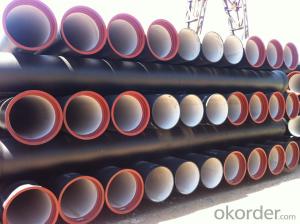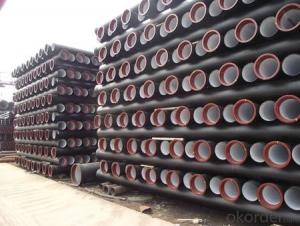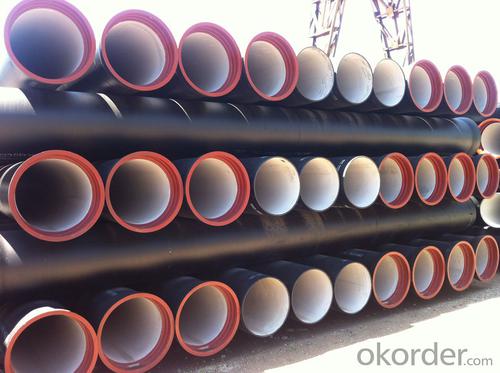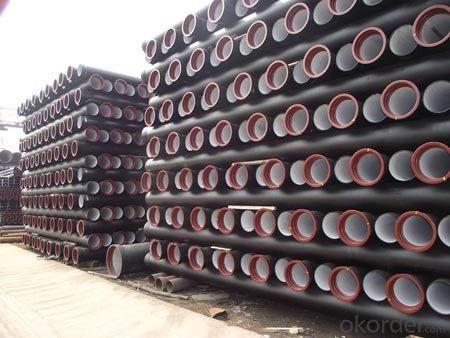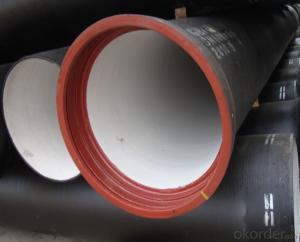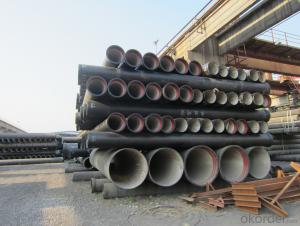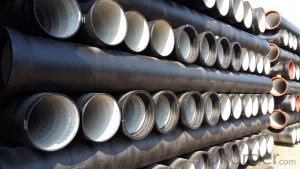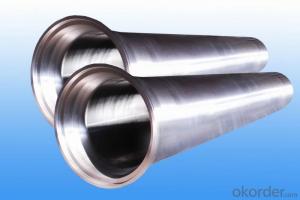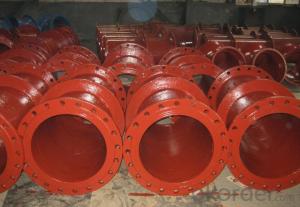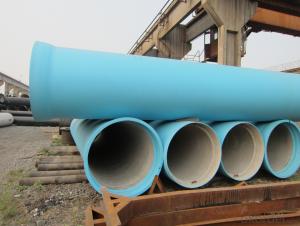Ductile Iron Pipe of China DN100-DN800 EN545 for Water Supply
- Loading Port:
- China main port
- Payment Terms:
- TT or LC
- Min Order Qty:
- 20 m.t.
- Supply Capability:
- 50000 m.t./month
OKorder Service Pledge
OKorder Financial Service
You Might Also Like
1,Ductile Iron Pipe Description :
DI pipe fittings are manufactured according to ISO 2531 or BS EN545 or BS4772 FOR POTABLE WATER ,internal is cement lining or wet epoxy coating;External is zinc plus bitumen or wet epoxy coating. We also manufacture ductile iron fittings with fusion bonded epoxy both inside and outside. All the producets are sutible to water pipes fields.
Pipes confirm to ISO2531,K9 class,T type joint,6m long,with inside cements lining conform to ISO4179, outside Zinc spraying(130g/m2) and bitumen coating(70μm) conform to ISO8179.
Pipe ends: Spigot and socket ends, with 100% SBR rubber gaskets accoding to ISO4633
2,Main Features of the Ductile Iron Pipe:
·High yield strength
·High tensile Strength
·High corrosion resistance
·Pressure Resistence
·Anti-corrosion
·Installation is convenient
·Satisfy the highest hygienic standards
Material: Ductile iron grade 500-7/ 450-10 in accordance with ISO1083
Standard: ISO 2531, EN545, EN598, ANSI, AWWA
Certificate: ISO9001, ISO14001, SGS, NSF, WRAS
Test: In accordance with ISO 2531 / EN 545 / EN598 and 100% water pressure test
Length: 6m or cut into 5.6m, 5.7m, 5.8m
3,Ductile Iron Pipe Images:
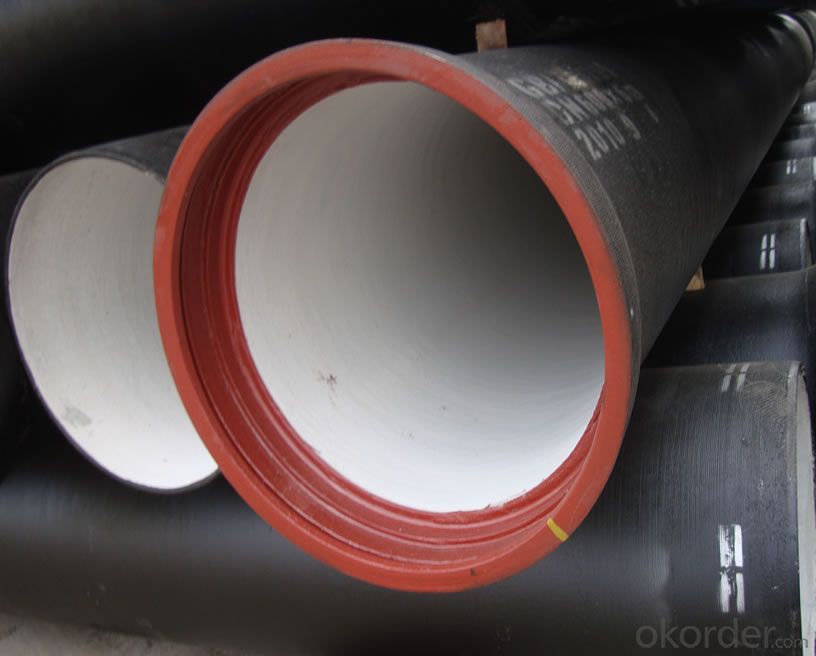
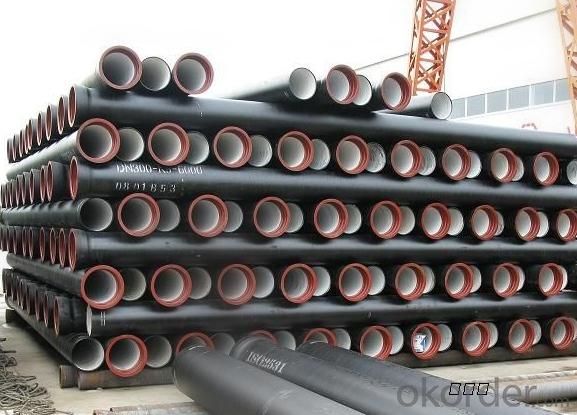
4. Ductile Iron Pipe Specification
Quick Details
Place of Origin: China (Mainland)
Model Number: DN80-1600 Length: 6M/5.7M/NEGOTIATED Standard: ISO2531 / EN545
Application: Potable/Sewage Water
Diameter: DN80-1600
Shape: Round
Hardness: 230 Pipe
Wall Thickness: standerd
Pull Strength: 420
Yield (≥ MPa): 300
Material: Ductile Iron water ductile iron pipe: SO2531 / EN545 DI pipe
Packaging & Delivery
Delivery Detail: 30-45 days
ductile iron pipe:
1. DN80-DN1600mm (T-Type, Class K9)
2.effective length 6m/pc
3.comply with ISO2531/EN545/EN598
5.FAQ:
We have organized several common questions for our clients,may help you sincerely:
1.Q: Why would you choose ductile iron pipe rather than other pipe materials?
A:The reasons are obvious for that not only ductile iron pipe possesses the inherent strength and flexibility of ductile iron, combined with proven corrosion protection systems, but also the cost savings can be achieved from design to installation and commissioning.
2.Q:Why can you guarantee the inner of pipes can’t be corroded?
A: High alumina cement mortar lining and sulphate-resistant cement mortar lining. These two special linings are applicable to inner anti-corrosion for sewage pipes, improving resistance to erosion of the sewage components.
- Q: Do ductile iron pipes require special handling during transportation?
- Transporting ductile iron pipes requires special handling. While these pipes are known for their strength and durability, improper handling can result in damage. Due to their weight and size, it is crucial to use appropriate lifting and handling equipment. Dropping or impacting the pipes must be avoided to prevent cracks or fractures. Moreover, pipes should be stored and transported securely to prevent rolling or shifting, which could harm the pipe coating and fittings. Additionally, it is advisable to shield the pipes from extreme temperatures or adverse weather conditions during transportation. Adhering to these guidelines and taking necessary precautions will minimize the risk of damage during transportation.
- Q: Can ductile iron pipe be used for water treatment plant applications?
- Yes, ductile iron pipe can be used for water treatment plant applications. Ductile iron pipe is known for its strength and durability, making it suitable for transporting water and other fluids in various industrial settings, including water treatment plants. Its corrosion resistance and ability to withstand high pressure and temperature make it an ideal choice for applications where the pipe is exposed to chemicals, disinfectants, and other treatment processes. Additionally, ductile iron pipe is easy to install, maintain, and repair, making it a cost-effective option for water treatment plant infrastructure.
- Q: How do ductile iron pipes handle thermal cycling in industrial applications?
- Ductile iron pipes are well-suited for handling thermal cycling in industrial applications. Due to their high thermal conductivity and low thermal expansion coefficient, they can effectively and safely withstand the stresses caused by repeated heating and cooling cycles. This makes them highly resistant to cracking, distortion, or other forms of thermal damage, ensuring their durability and reliability in industrial environments.
- Q: What is the expected external coating for ductile iron pipes?
- The expected external coating for ductile iron pipes is typically a protective layer that is applied to the exterior surface of the pipe to prevent corrosion and extend its lifespan. Some common types of external coatings for ductile iron pipes include polyethylene, polyurethane, and epoxy coatings. These coatings provide a barrier between the pipe and the surrounding environment, preventing the pipe from coming into contact with corrosive substances such as soil, water, and chemicals. The choice of coating depends on factors such as the intended application, soil conditions, and the level of corrosion protection required. Overall, the expected external coating for ductile iron pipes is designed to ensure the longevity and durability of the pipes in various environmental conditions.
- Q: Are ductile iron pipes more resistant to breaks and cracks than other pipe materials?
- Yes, ductile iron pipes are generally more resistant to breaks and cracks compared to other pipe materials. Their unique composition and manufacturing process make them highly durable and flexible, allowing them to withstand high pressure, heavy loads, and ground movement without breaking or cracking easily.
- Q: There are several forms of flexible interfaces for Spigot Cast Iron Pipes
- Socket type cast iron pipe rigid interface antiallergic can, under the action of external force, no tower water supply equipment interface packing easy fragmentation and leakage, especially in the weak foundation and uneven subsidence area and the earthquake zone. The interface damage rate is higher. Therefore, flexible interfaces should be adopted under the above unfavorable conditions.
- Q: How do ductile iron pipes perform in high-traffic areas?
- Ductile iron pipes perform well in high-traffic areas due to their durability and strength. They have the ability to withstand heavy loads and traffic loads without experiencing deformation or damage. Additionally, their corrosion resistance properties make them suitable for prolonged exposure to moisture and harsh environmental conditions. Overall, ductile iron pipes are a reliable choice for high-traffic areas.
- Q: What is the expected sound transmission loss of ductile iron pipes?
- The expected sound transmission loss of ductile iron pipes can vary depending on various factors such as pipe thickness, diameter, and installation conditions. However, ductile iron pipes are generally known for their good acoustic performance and can provide significant sound reduction, especially compared to other types of pipes like PVC or cast iron.
- Q: Are ductile iron pipes resistant to UV radiation?
- Ductile iron pipes do not possess resistance against UV radiation. The exposure to UV radiation can lead to the deterioration and weakening of the material as time goes by. In order to safeguard ductile iron pipes from UV radiation, they must be covered or enveloped with a UV-resistant substance or coated with an appropriate protective layer. Furthermore, it is essential to conduct regular inspections and maintain the pipes adequately to identify and rectify any indications of UV damage.
- Q: Are ductile iron pipes suitable for water distribution networks?
- Ductile iron pipes are a suitable choice for water distribution networks. They have been widely used in water distribution systems for many years, thanks to their numerous advantages. To begin with, ductile iron pipes possess excellent durability and a long lifespan. Their resistance to corrosion is crucial for water pipes since they are continuously exposed to various chemicals and substances in the water. This corrosion resistance ensures that the pipes maintain their structural integrity over time, reducing the frequency of repairs or replacements. Furthermore, ductile iron pipes have a high strength and can withstand high pressure, making them ideal for water distribution networks. They can handle heavy loads and resist external forces such as soil movement or traffic loads, guaranteeing the safety and reliability of the water supply. Moreover, ductile iron pipes exhibit excellent hydraulic properties. With their smooth internal surfaces, they minimize friction and pressure drop, enabling the efficient flow of water through the system. This aids in conserving energy and reducing pumping costs, making ductile iron pipes a cost-effective choice for water distribution networks. Additionally, ductile iron pipes are versatile and can be easily installed in various soil conditions. They can endure ground movement and settle without breaking, which is crucial for maintaining a stable water distribution system. In conclusion, ductile iron pipes are highly suitable for water distribution networks due to their durability, resistance to corrosion, high strength, excellent hydraulic properties, and versatility in installation. They offer a reliable and efficient solution for delivering safe and clean water to communities.
Send your message to us
Ductile Iron Pipe of China DN100-DN800 EN545 for Water Supply
- Loading Port:
- China main port
- Payment Terms:
- TT or LC
- Min Order Qty:
- 20 m.t.
- Supply Capability:
- 50000 m.t./month
OKorder Service Pledge
OKorder Financial Service
Similar products
Hot products
Hot Searches
Related keywords
